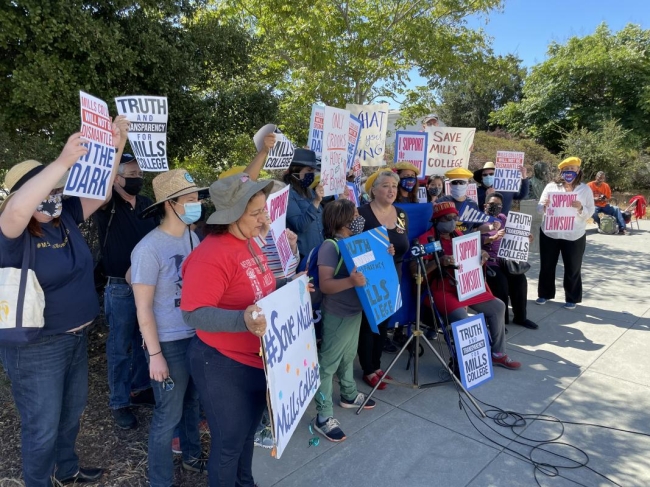You have /5 articles left.
Sign up for a free account or log in.

Members of the Alumnae Association of Mills College and Save Mills College Coalition rally outside the Alameda County Courthouse.
Courtesy of the Alumnae Association of Mills College
Mills College announced four months ago that it would no longer admit new students. Two months later, officials said the private, nonprofit California college was considering a potential acquisition by Northeastern University. A coalition of Mills alumnae, faculty members, students and some trustees say the college’s financial situation may not warrant such extreme measures -- and they’re pulling out the stops to slow down the fast-moving process.
After repeated attempts to obtain more information from the college about its financial health, a Mills trustee and president of the Alumnae Association of Mills College Board of Governors filed a lawsuit last month against members of the Mills administration. Meanwhile, the Save Mills College Coalition is skeptical that Mills must close or sell soon and has asked the California attorney general to investigate college leadership.
“We at Save Mills are saying, ‘Stop. Let us see what’s really going on here,’” said Kieran Turan, a member of Save Mills College and a longtime supporter of the college. “This is a precious institution.”
Viji Nakka-Cammauf, president of the board of the Alumnae Association of Mills College and a member of the college’s Board of Trustees, filed a lawsuit against Mills president Elizabeth Hillman and other administrators and board members. Tara Singh, a former member of the Mills board, joined Nakka-Cammauf as a plaintiff in the lawsuit.
The plaintiffs have asked the court to force Mills to hand over financial information about the college and its potential acquisition by Northeastern, which they allege has been withheld from them. They have also requested a 60-day restraining order that would prevent Mills from moving forward with acquisition negotiations until after the plaintiffs have a chance to review the requested information.
The college has technically allowed Nakka-Cammauf to view the records she requested. Before she filed the lawsuit, Mills officials told Nakka-Cammauf she could come to the college to view the records without making copies and without counsel. But doing so would have been difficult and would not have allowed her to make a fully informed decision, the lawsuit said.
A group of supporters rallied Monday outside the Alameda County Superior Courthouse, where the complaint was filed. The plaintiffs are hoping the court will issue a decision before the Mills board votes to move ahead with the acquisition by Northeastern in 10 days.
The college declined to comment on the lawsuit.
Hillman, the president of Mills, has made few public comments since she announced in March that the women's college would cease admitting new students, and the college has declined to make anyone available for a phone interview about the potential acquisition by Northeastern.
In the handful of public statements Hillman has released, she described several factors that led to Mills’s poor finances: ongoing budget deficits, declining enrollment and structural changes in higher education. She also cited the COVID-19 pandemic, which ripped through college budgets, depressed their revenue streams and left many with retention and enrollment challenges.
Save Mills College is mindful of the college's financial challenges, but remains unconvinced that the institution's only paths forward are closure or merger. The group recently brought its concerns to the California attorney general and asked the office “to take steps to replace Mills College’s current officers and trustees as part of an overall effort to stabilize Mills and put it back on the path to true sustainability,” according to a press release.
The attorney general’s office in turn asked the group if it had an opinion of Mills’s financial situation that differed from Hillman’s public statements.
In response, Save Mills College passed along a report it had commissioned from Stefano Falconi, a higher education financial planning expert and managing director of the higher education practice at Berkeley Research Group. In his report -- which draws on publicly available financial information, including Mills’s audited financial statements -- Falconi concluded that Mills’s financial issues began long before the pandemic and that the college has enough assets to continue operating for some time.
“This is not the time to make a decision on the future of the college, and even less to condemn it to possible oblivion and no future,” Falconi said in an interview.
To support this conclusion, Falconi points to the $4.5 million in relief funds that Mills received from the federal government during the pandemic, its 135-acre campus in the San Francisco Bay Area and a valuable art and literature collection. The college also maintains a $187 million endowment, most of which is donor restricted but could potentially be tapped in extreme circumstances.
College officials have tried many times in recent years to right the ship. Mills has declared a financial emergency, laid off dozens of faculty members, reset its tuition price, implemented a financial stabilization plan and sold signature works from Shakespeare and Mozart.
But such efforts have not resulted in long-term stability, in part because of a lack of planning by college leaders, Falconi said.
“There is very little strategic planning that I could see in the most recent years that I’ve looked at -- and that is putting it charitably,” he said.
Even if a college has the resources to stay open for a short while longer, it might still be in everyone’s best interest to begin winding down operations, said Larry Ladd, a senior consultant at AGB. Some college leaders announce closures years in advance to give students and employees time to adjust.
“If you look at the colleges and universities that announced they closed, many of them -- probably a majority in the last two years -- were not compelled by outside entities, but in fact made the decision themselves,” Ladd said. “Either because they thought they still had resources and thought it was in the best interest of the college to close, or in some cases they ran out of cash.”
David Chard has made this decision before. He is the former president of Wheelock College, which was acquired by Boston University in 2018.
“This is the decision we made at Wheelock,” Chard said. “The trustees said, ‘We’re probably more valuable in 2017 than we will be in 2022, so now is the time for us to go out and look for a partner where they see us as a value and not as an institution who is desperate and has no negotiating power.’”
Save Mills College does not know when or if the attorney general will intervene at Mills. A spokesperson for the college did not say if Mills had been communicating with the attorney general’s office.




